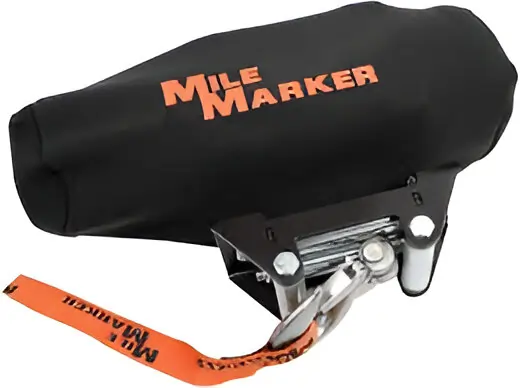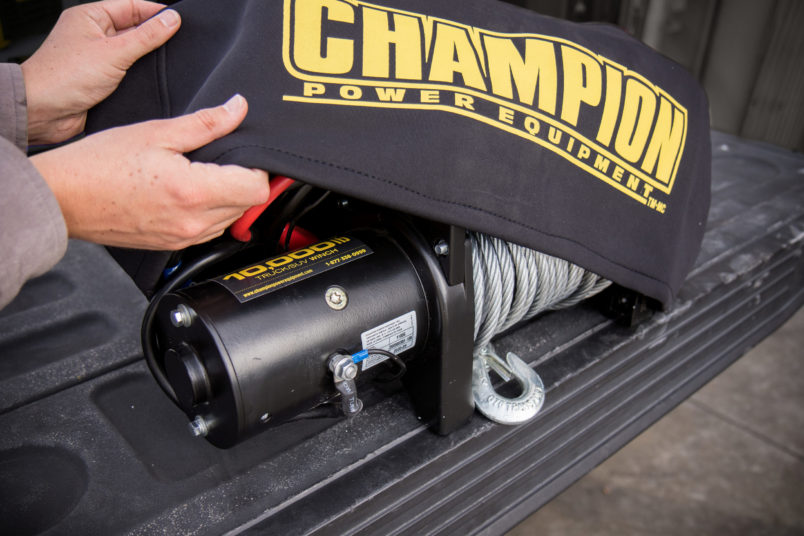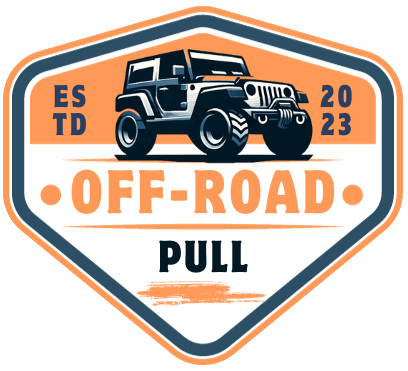If you’re into off-roading or heavy-duty work, you already know how important your winch is. But here’s something many people overlook – protecting that winch when it’s not in use.
That’s where a best winch cover comes in. In this article, I’ll break down what a winch cover is, why you need one, and the best use cases for it.
What is a Winch Cover?

A winch cover is a protective barrier designed to shield your winch from the environment. Its main purpose is to keep things like rain, snow, dirt, and harmful UV rays from damaging your winch when it’s not in use. Think of it as a weather-resistant guard that preserves your winch’s functionality.
Winch covers are typically made from durable materials like heavy-duty nylon or vinyl, both of which are strong enough to withstand harsh outdoor conditions.
You’ll find two main types of winch covers: flexible ones that can easily wrap around different shapes, and rigid ones that offer a more structured fit.
When choosing a winch cover, it’s important to get the right fit. You can go for custom-fit covers designed specifically for your winch model, or opt for a universal cover that adjusts to various winch sizes.
Either way, the goal is to protect your winch from the elements and extend its lifespan.
Why Do You Need a Winch Cover?

A winch cover is more than just an accessory—it’s an essential piece of protection for your winch. Here’s why:
Protection from Dirt and Debris: Off-roading often means dealing with a lot of dust, mud, and small rocks. Without a cover, these particles can get inside the winch, causing it to jam or wear down the moving parts.
A cover acts as a shield, keeping everything clean and preventing mechanical issues.
Preventing Rust and Corrosion: Moisture is your winch’s worst enemy, especially if you’re in a humid environment or near the ocean. When water or salt enters your winch, it can lead to rust and corrosion.
Over time, this damages the internal components, making the winch unreliable. A winch cover keeps moisture out, preventing this kind of damage.
Shielding from UV Rays: Constant sun exposure can cause UV rays to break down the materials on your winch, especially the rubber and plastic parts. Over time, this leads to cracking, fading, and overall weakening of the winch.
A cover blocks UV rays and preserves the condition of your winch.
Extending Winch Lifespan: Your winch is an investment, and protecting it with a cover means you’ll get more years of reliable use.
By keeping it safe from the elements, dirt, and wear, you reduce the chances of costly repairs or needing a replacement. It’s a small step that saves you money and hassle in the long run.
How Does a Winch Cover Protect Your Winch?
A winch cover is like a protective barrier that keeps your winch safe from the elements. It’s designed to stop dirt, moisture, and sunlight from damaging the winch’s parts. Here’s how it works:
Keeps Dirt and Debris Out: Dust, mud, and small particles can easily get into the winch’s components, causing them to wear out or jam. The cover blocks all that, keeping the winch clean and ready for use.
Prevents Moisture Damage: Rain, snow, or even humidity can cause rust and corrosion inside the winch. A waterproof winch cover seals off the winch, preventing water from getting in and damaging the sensitive parts.
UV Protection: Sunlight can be surprisingly harmful. The UV rays can break down materials like rubber and plastic over time, making them brittle and prone to cracking.
A winch cover blocks these rays, helping maintain the integrity of these materials and ensuring the winch functions properly when needed.
Top Use Cases for a Winch Cover
Using a winch cover is crucial in many situations. Here are the main use cases where a winch cover proves its value:
Off-Roading Enthusiasts: If you frequently take your vehicle off-road, your winch is exposed to mud, dust, and wet conditions. Without a cover, this can lead to dirt buildup and moisture getting into the winch’s moving parts.
A winch cover protects it from all that, ensuring it’s always ready when you need it.
Outdoor Equipment Storage: If your vehicle stays parked for long periods or you only use your winch seasonally, a winch cover is essential. When equipment sits idle, exposure to the elements like rain and sunlight can degrade it.
A cover keeps your winch protected, so it’s in top condition when you need it again.
Marine Applications: If your winch is used near saltwater or marine environments, rust and corrosion can happen quickly. Saltwater is particularly harsh on metals.
A winch cover acts as a shield, blocking out salt exposure and preventing rust from forming on the winch components.
Heavy-Duty Work Trucks: For those using their winches for heavy-duty work or on trucks, a winch cover ensures that frequent exposure to dust, dirt, and weather doesn’t affect the equipment.
This is especially helpful for contractors or work vehicles that may face harsh weather conditions during downtime.
Key Features to Look for in a Winch Cover
When choosing a winch cover, it’s important to focus on features that provide maximum protection and durability. Here are the key elements to consider:
Water Resistance: A good winch cover should be either fully waterproof or highly water-resistant. This is crucial to keep out rain, snow, or even moisture from the air, which can lead to rust and corrosion.
Ensure the cover materials are designed to repel water and protect the internal components from moisture damage.
UV Protection: Sun exposure can degrade your winch over time, especially the rubber and plastic parts. A winch cover with built-in UV protection helps shield it from harmful rays that cause fading, cracking, and weakening of materials.
Look for covers that advertise UV-blocking capabilities, particularly if your winch is exposed to direct sunlight often.
Durability: The material of the winch cover should be tough enough to withstand daily wear and tear. It should resist punctures, tears, and abrasions, especially if you’re in rough environments like off-road terrains or construction sites. Heavy-duty nylon or reinforced vinyl are good material choices.
Fitment: A proper-fitting cover is essential. It should snugly wrap around your winch, providing complete coverage without being too loose or tight. Custom-fit covers offer better protection for specific winch models, but universal covers can work well too if they’re adjustable.
Fastening Mechanisms: Make sure the cover has secure straps, cords, or elastic hems to keep it in place, even in windy or rough conditions. A cover that easily blows off defeats the purpose, so these fastening features are important for keeping it secured, no matter the weather.
Conclusion
A winch cover may seem like a small, simple accessory, but it plays a huge role in keeping your winch functional for the long haul.
By protecting your winch from the elements – be it dirt, water, or UV rays – you can ensure it’s always ready when you need it. Whether you’re off-roading, working, or simply storing your vehicle, a winch cover is a smart investment.
FAQs
Can I use any cover for my winch?
No, it’s best to use a cover specifically designed for winches. Regular tarps or other makeshift covers might not provide the same level of protection.
How often should I replace my winch cover?
With proper care, a high-quality winch cover can last several years. However, if you notice any rips, fading, or loss of water resistance, it’s time to get a new one.
What happens if I don’t cover my winch?
Without a cover, your winch is exposed to dirt, moisture, and UV rays, which can cause rust, corrosion, and degradation of materials. This could lead to costly repairs or even the need for a new winch.
Is a winch cover necessary in mild climates?
Even in mild climates, dust and UV rays can still cause damage over time. A winch cover ensures your winch stays in top condition, no matter where you are.

